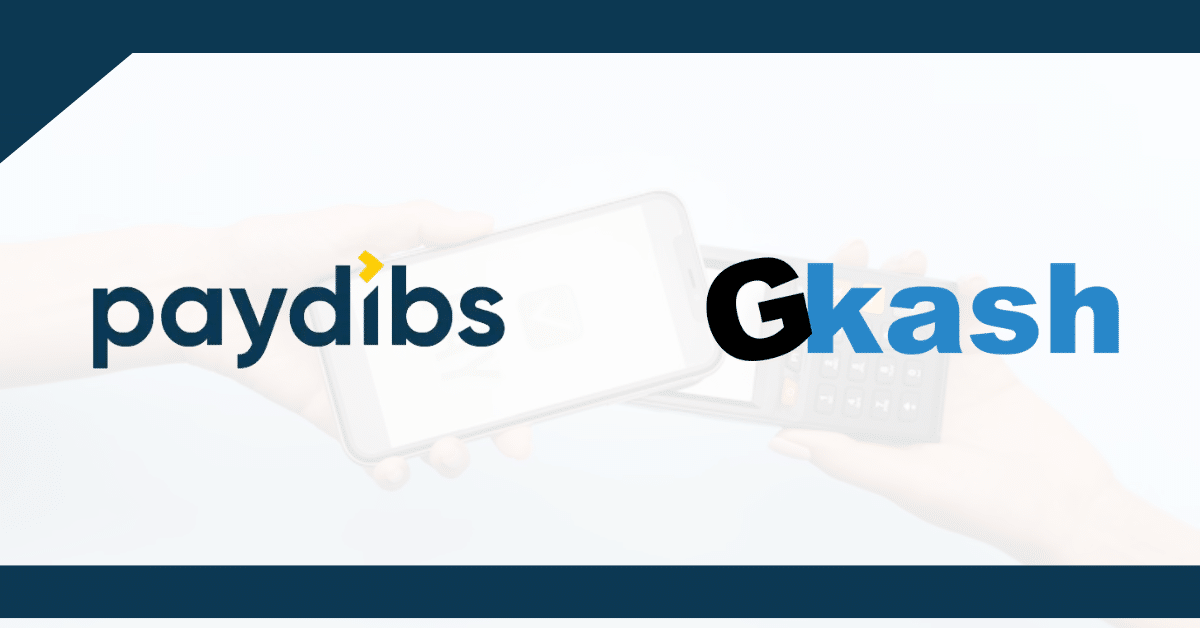The digital economy in Malaysia is poised to be one of the fastest growing sectors in 2025. With the rise of gig-work, use of digital payments and greater accessibility to the internet, selecting the right payment gateway Malaysia has to offer, plays an important role in ensuring smooth business operations and better customer experience.
Among the many payment gateways available, Paydibs and Gkash stand out as two popular choices that SMEs and businesses have grown to like.
Both cater to SMEs, startups, and retail businesses, but which one suits your business needs better in 2025? This article provides a comprehensive comparison of Paydibs and Gkash, covering pricing, features, supported payment methods, settlement speed, hardware options, and security. So, let’s get to it.
1. Company Background and Regulatory Compliance
“Both Paydibs and Gkash are Malaysian payment service providers regulated by Bank Negara Malaysia. They adhere to strict security standards, including PCI DSS compliance.”
- Paydibs focuses on providing flexible solutions for both online and offline merchants, including e-commerce integrations and point-of-sale (POS) terminals.
- Gkash targets primarily online merchants and SMEs, with a straightforward pricing structure and support for popular payment channels such as FPX and e-wallets.
Their status as regulated entities and commitment to security provide merchants with confidence in their operations, so merchants can sleep soundly at night knowing their money and transactions are safe.
2. Pricing and Package Comparison
Pricing is a major factor when choosing a payment gateway. The fees and subscriptions quickly add up over time and business owners with limited resources should definitely consider this. Fortunately, both providers offer competitive fees, but the structure and hardware options differ.
Feature | Paydibs | Gkash |
Signup Fee | FREE | RM200 (50% discount for SMEs) |
Annual/Maintenance Fee | RM300 (online package) | RM100 (SME Starter Plan) |
Terminal Rental | RM40/month | Not publicly disclosed |
Terminal Purchase | RM480 (one-time) | Not publicly disclosed |
Refundable Deposit | RM500 (for terminal rental) | Not applicable |
Disclaimer: The pricing and fee details provided in this article are based on publicly available information as of 2025. For the most accurate and up-to-date pricing, packages, and terms, please refer to the official websites of Paydibs and Gkash or contact their customer service directly.
Paydibs offers a free signup fee and flexible payment terminal options, making it suitable for businesses that require both online and offline payment capabilities. Gkash’s pricing is straightforward, with a low annual fee and setup fee that is reduced for SMEs.
However, it focuses more on online payment acceptance without clear hardware rental or purchase options.
3. Transaction Fees and Merchant Rates
Understanding transaction fees helps businesses plan their operating costs accurately. Both gateways charge based on payment methods, with some differences.
Payment Channel | Paydibs Fee Range | Gkash Fee Structure |
Credit/Debit Cards | Approximately 1.8% – 2.5% | Minimum 1.8% or RM0.60 per txn |
FPX (Online Banking) | From 1.0% | From 1.0% |
E-wallets | Between 1.5% – 2.0% | Around 1.0% |
Gkash sets a minimum charge of RM0.60 for card transactions, which means smaller transactions might be slightly more expensive than percentage-based fees alone.
Paydibs offers a flexible fee range, which varies depending on the subscribed package and transaction volume.
Read More: Paydibs vs ToyyibPay: Custom or Simple Payment Integration?
4. Supported Payment Methods and Flexibility
Both gateways cover essential payment methods common in Malaysia, but there are subtle distinctions.
Paydibs supports:
- FPX Online Banking with most Malaysian banks (Maybank, Hong Leong, CIMB Bank)
- Credit and debit cards (Visa, Mastercard, UnionPay)
- Popular e-wallets: Boost, GrabPay, Touch ‘n Go, ShopeePay, MAE
- QR code payments and DuitNow
- Buy Now Pay Later (BNPL) options
- International payments (except via mobile app)
Gkash supports:
- FPX Internet Banking with major banks such as Maybank, CIMB, AmBank, OCBC
- Credit/Debit cards (local schemes)
- E-wallets including Boost, GrabPay, Touch ‘n Go, Maybank QRPay
- Local payments primarily, with limited international support
The inclusion of BNPL and international payment options gives Paydibs an edge for businesses targeting wider markets or requiring flexible payment choices.
5. Settlement Period and Cash Flow Impact
Timely settlement of payments can make a significant difference to cash flow management.
Feature | Paydibs | Gkash |
Settlement Timing | T+1 or T+2 business days* | T+2 business days |
Exclusions | Weekends & public holidays | Weekends & public holidays |
*Paydibs offers T+1 day settlement when acting only as the gateway, depending on the acquiring bank.
Faster settlements offered by Paydibs can be particularly beneficial for SMEs and startups who need quick access to funds and cash flows, which is the lifeblood of the businesses.
6. Hardware and Offline Payment Solutions
Businesses with physical storefronts or mobile sales channels often require payment terminals or apps. That credit card machine isn’t just for show, it’s important because customers expect their preferred method of paying, be it card or QR.
- Paydibs provides a Smart Terminal that can be rented (RM40/month) or bought outright (RM480). It also offers a mobile app that supports e-wallet and BNPL payments at no hardware cost, making it a cost-effective choice for merchants with physical stores or pop-up sales.
- Gkash primarily focuses on online payments with limited publicly available information on hardware or POS options, meaning that it’s only suitable for online-only businesses.
7. Integration and Developer Support
Both payment gateways offer integration options for popular e-commerce platforms and developer-friendly APIs.
Feature | Paydibs | Gkash |
Supported Platforms | WooCommerce, Magento, Custom APIs | WooCommerce, Shopify, Custom APIs |
Developer Tools | APIs, SDKs, Mobile SDKs | API access available |
Merchant Dashboard | Real-time transaction tracking | Real-time transaction tracking |
These tools allow businesses to manage transactions efficiently and tailor payment acceptance to their website or app needs. They even provide real-time transaction reporting and integration with popular accounting software.
8. Security, Trust, and Customer Support
Although we touched upon security, it’s important that we reiterate how important it is, after all, your business’s money is on the line and that security should not be compromised for the sake of convenience or austerity.
- Both payment gateways are PCI DSS compliant and regulated by Bank Negara Malaysia, meaning they are licensed and approved by higher authorities.
- They use tokenisation, 3D Secure authentication, and encryption to secure transactions.
- Customer support is available through hotlines and ticketing systems, Paydibs is noted for their responsive 24/7 customer support, while Gkash provides simple onboarding processes that makes it easy for microbusinesses.
Summary Comparison Table
Criteria | Paydibs | Gkash |
Signup Fee | Free | RM200 (50% SME discount) |
Annual Fee | RM300 (online) | RM100 (SME plan) |
Terminal Rental | RM40/month | Not disclosed |
Terminal Purchase | RM480 one-time | Not disclosed |
Card Transaction Fees | ~1.8%–2.5% | Min 1.8% or RM0.60 |
FPX Fees | From 1.0% | From 1.0% |
E-wallet Fees | ~1.5%–2.0% | Around 1.0% |
Payment Methods | Extensive (incl. BNPL, international.) | Mainly local payment options |
Settlement Time | T+1 or T+2 days | T+2 days |
Hardware Options | Smart Terminal, Mobile App | Limited info |
Integration Platforms | WooCommerce, Magento, API | WooCommerce, Shopify, API |
Security Compliance | PCI DSS, 3D Secure, BNM | PCI DSS, 3D Secure, BNM |
Picking the Right Payment Gateway
For businesses looking for cost-effective, flexible payment solutions with both online and offline options, Paydibs offers a wide range of features with attractive fees and hardware support. I
Gkash is a solid choice for businesses prioritising simple, affordable online payment acceptance. However, the lack of visible hardware options may limit its use for merchants needing physical payment terminals.
Ultimately, choosing between Paydibs and Gkash depends on your specific business needs:
- If you require hybrid payment capabilities (online + physical store) and faster settlements, Paydibs is likely the better option.
- If your business is mostly online with simple payment needs and a limited budget, Gkash could be the preferred gateway.
If you’re still undecided, it’s advisable to contact both providers for detailed quotes and demos to see which fits your business operations best. Or you can check out our Top 10 Payment Gateway Malaysia to see the other notable payment terminals in Malaysia!
Legal Disclaimer:
All brand names, trademarks, and logos displayed on this website are the intellectual property of their respective owners. Their use herein is solely for descriptive and identification purposes. This website makes no claim of ownership, endorsement, or official association with any of the mentioned brands unless expressly stated.
Frequently Asked Questions About Paydibs vs Gkash
No. Gkash primarily supports Malaysian Ringgit and does not advertise multi-currency or cross-border payment support.
Yes. Paydibs provides API tools that support recurring billing, making it suitable for subscription-based services.
As of 2025, Gkash does not offer a dedicated mobile app for merchants; transaction tracking is done via the merchant portal.
Paydibs is noted for providing detailed API and SDK documentation, including mobile integration support.
Paydibs supports integration with smart POS terminals; Gkash’s POS support is limited or not clearly documented.
Yes, both gateways provide basic real-time transaction tracking and downloadable reports via their merchant dashboards.















